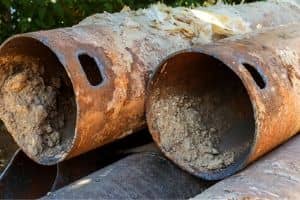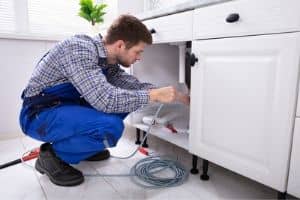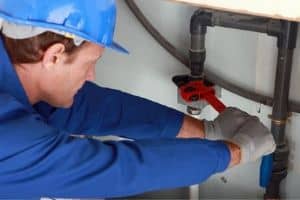
When we mention the topic of corroded pipes most homeowners wonder what we are talking about, especially if they just bought a new home. The truth is corroded pipes can be an expensive issue for all homeowners, not just those who own properties that are several years old.
This article will tell you a little bit about how pipe corrosion happens, even in new homes. Then we’ll give you some advice on how to stop corroded pipes from becoming something you have to deal with.
Finally, will give you some direction on what to do if you suspect that your plumbing’s pipes are corroded. So, read on to learn how pipe corrosion forms in the first place.
Certain Conditions Make You Vulnerable to Pipe Corrosion
The first thing to understand is that certain conditions make pipes more likely to corrode. Here’s a quick breakdown of just a few:
 Your Water’s Composition: We all take for granted that water is water, but that’s not entirely true. While most of us can rely on the water in our homes to be safe to drink, we might not be sure of what exactly is in our water. Dissolved minerals can react with the inside of our pipes to create a chemical reaction that corrodes these surfaces. Warmer water is also known for being more corrosive than cold, that’s why you may notice any corrosion on the hot side of your system first.
Your Water’s Composition: We all take for granted that water is water, but that’s not entirely true. While most of us can rely on the water in our homes to be safe to drink, we might not be sure of what exactly is in our water. Dissolved minerals can react with the inside of our pipes to create a chemical reaction that corrodes these surfaces. Warmer water is also known for being more corrosive than cold, that’s why you may notice any corrosion on the hot side of your system first.- A Pipe’s Material: Pipes are constructed of many different materials. In the past, builders used galvanized steel pipe, which can break down and rust on the inside. Builders then moved to copper, which is more stable but still vulnerable to reactions with minerals in the water. This is especially true of copper pipes that are getting a little bit older. New homes usually rely on PVC or other plastics for the pipes in them. These materials are less reactive but still can suffer from a build-up of minerals.
- Pressure, pH, and Construction Methods: Finally, strong water pressure is great but the higher velocity of the water can erode plumbing quicker than slower low-pressure water supplies. Also, if your water has a lower than normal pH, it is said to be acidic. This slightly acidic water is more reactive, fueling chemical reactions between the water and the pipes.
- The Type of Pipe: Lastly, if your home is made up of different types of pipes, the areas where two different types of metal must be properly joined. If not, they run the risk of causing corrosion which will build up in the system.
So, now we know what can cause corrosion, here’s what you can do to prevent it before it starts.
How to Ensure Clean Pipes
 This section is really important, even for owners of brand new homes. When the water conditions are not properly treated, a brand new home can suffer major corrosive damage in just a few years.
This section is really important, even for owners of brand new homes. When the water conditions are not properly treated, a brand new home can suffer major corrosive damage in just a few years.
Something all homeowners need to do is to test their water. A simple test available with most plumbers or even as kits at a hardware store will tell you what you're dealing with.
The biggest culprit is “hard water.” Water is considered hard when there are excessive amounts of minerals such as calcium dissolved in it. This calcium reacts with the pipes and causes them to corrode. Eventually, the water pressure will drop and fixtures will fail.
Untreated water can corrode not only your home’s pipes but its appliances as well. Installing a water softener can remove these harmful minerals from the water and stop corroded pipes from happening. Plus, your water heater will last longer too. A water softener will protect your home’s supply pipes, but the drain pipes require a different type of maintenance.
Drain pipes can corrode, but they are also prone to blockage from soap residue and hair. These forms of “corrosion” can best be prevented by adding a chemical agent to your drains every month or having them professionally augered a couple of times per year.
We’ve shared with you how to keep your pipes free of corrosion, but what can you do if you know that your pipes have a problem?
Repiping Your Home and Other Remedies to Pipe Corrosion
 Once you have corrosion in your piping system, it can seem like the only option is to start fresh and repipe the whole house.
Once you have corrosion in your piping system, it can seem like the only option is to start fresh and repipe the whole house.
Sometimes this is the best option, but many times we can suggest an alternative way to clear out these corroded pipes and get your water flowing smoothly again.
The first step if you suspect you have some corrosion issues is to get a professional plumber to assess your system. They may identify that the problem is not as pervasive as it seems and is easily fixed with a small repair.
One thing is true; if you have corroded pipes they are not going to go away on their own. The sooner you act the better. At Honest Abe’s Home Services we’re well-schooled on helping homeowners overcome their plumbing problems.
Let us start with a professional assessment and recommend a specific remedy that is tailored just for your situation. Give us a call today at (618) 623-4116 and we’ll be happy to schedule an appointment.

